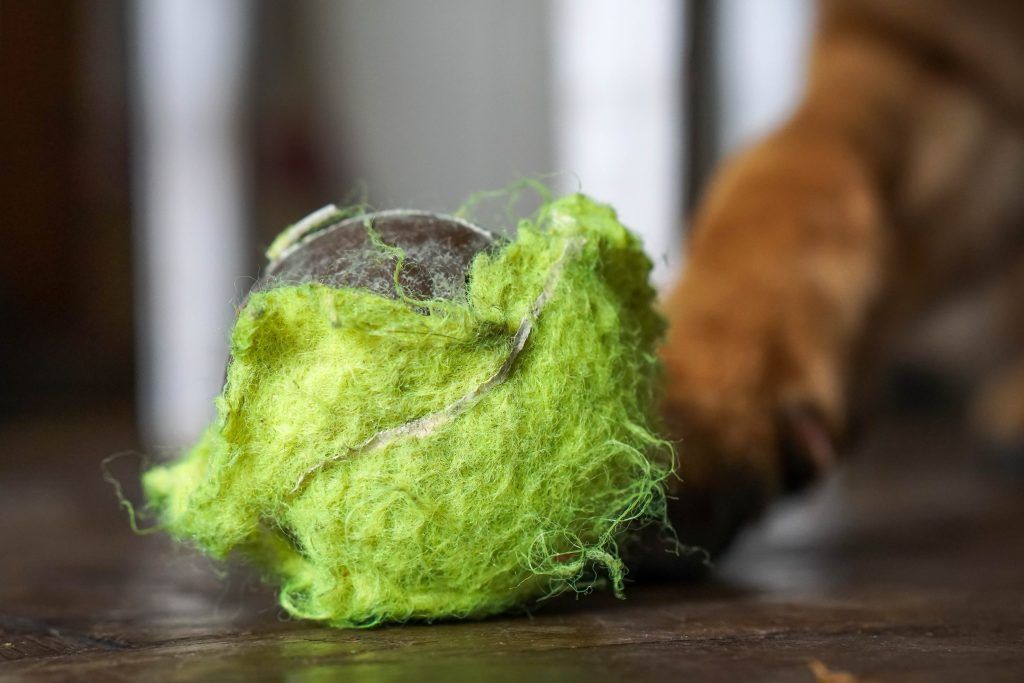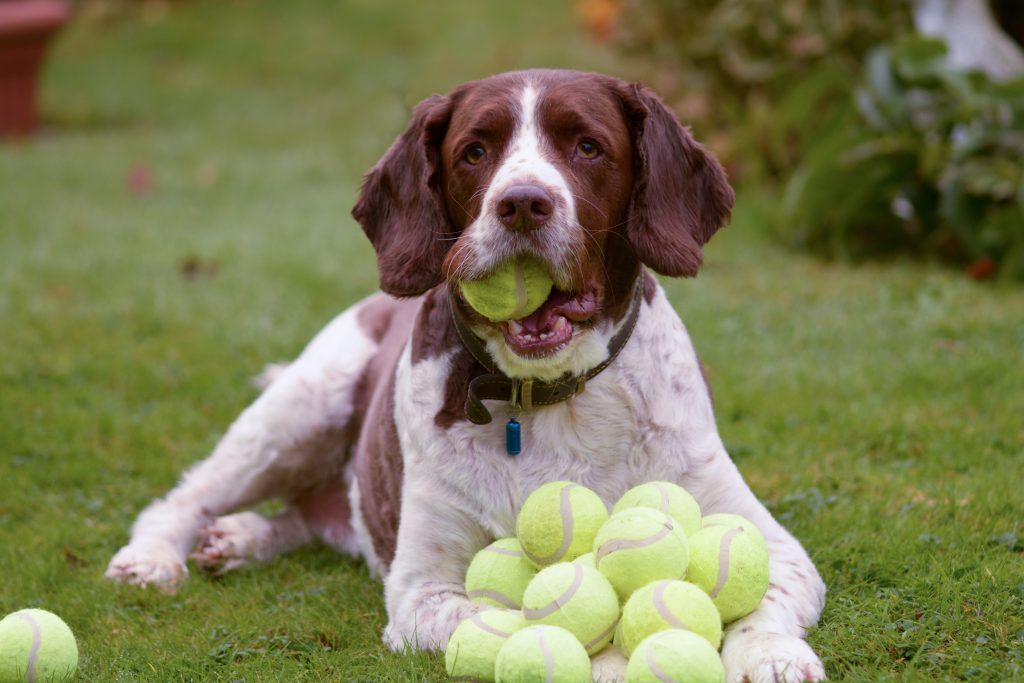Why Do Dogs Go Crazy For Tennis Balls
It’s no secret that dogs absolutely love tennis balls! Any dog I’ve ever met will go nuts if a tennis ball bounces past them. And, of course, when they catch it, it becomes the ultimate squishy chew toy.
Whether it’s chasing, fetching, chewing, or just carrying them around, tennis balls seem to have a special place in many dogs’ hearts. But why is that? What makes tennis balls so appealing to our furry friends?
6 Reasons Dogs Love Tennis Balls
There is no definitive answer to why dogs love tennis balls, as different dogs may have different preferences and motivations. However, here are some common factors that may contribute to their attraction:
1. Natural Instinct
One of the main reasons why dogs love tennis balls is because they fulfill their natural instinct to chase and catch prey. Dogs are descendants of wolves, who rely on their hunting skills to survive in the wild. Even though domesticated dogs do not need to hunt for food anymore, they still retain some of their ancestral behaviors and impulses.
Tennis balls can stimulate these instincts by mimicking the movement and appearance of small animals, such as rodents or birds. When a tennis ball is thrown or bounced, it becomes an artificial rabbit, triggering a dog’s chase response, which releases endorphins and dopamine in their brain, creating a sense of pleasure and excitement. When a dog catches a tennis ball, it satisfies their bite response, which gives them a sense of achievement and reward.
Some breeds, like the springer spaniel in the image above, may have stronger prey drives than others, depending on their original purpose and selective breeding by humans. For example, terriers were bred to hunt vermin, while retrievers were bred to fetch game birds. These breeds may be more inclined to chase and catch tennis balls than others.
2. Bonding
Another reason why dogs love tennis balls is because they can strengthen their bond with their owners or other dogs. Playing fetch with a tennis ball is a great way to interact with your dog, as it provides them with physical and mental stimulation, as well as attention and affection. It also teaches them important skills such as obedience, impulse control, and cooperation.
Dogs are social animals who crave companionship and communication. Playing with a tennis ball can help them express their emotions and personality, as well as understand your cues and signals. It can also reduce stress and anxiety and increase trust and loyalty.
Dogs can also enjoy playing with tennis balls with other dogs, as it allows them to socialize and have fun. It can also help them establish their hierarchy and roles within the group, as well as resolve conflicts and tensions.
3. Play and Exercise
Dogs love tennis balls because they are fun and engaging toys that provide them with play and exercise. Dogs need regular physical activity to stay healthy and happy, as it helps them burn calories, build muscles, improve circulation, prevent obesity, and prevent boredom.
Tennis balls are ideal toys for dogs because they are easy to throw, catch, carry, and chew. They also bounce unpredictably, which adds an element of challenge and surprise to the game. Dogs can play with tennis balls indoors or outdoors, alone or with others.
Playing with tennis balls can also stimulate a dog’s cognitive abilities, such as memory, problem-solving, learning, and creativity. It can also enhance their sensory perception, such as sight, smell, hearing, touch, and taste.
4. Color of Tennis Balls
Dogs love tennis balls because they are attracted to their bright yellow-green color. They do not see colors the same way humans do; they have fewer color receptors in their eyes than humans do. Dogs are like a human with red-green color blindness. They can only see shades of blue, yellow, and gray; they cannot see reds or greens.
However, dogs can still distinguish between different shades of colors based on their brightness or contrast. The yellow-green color of tennis balls is one of the most visible colors for dogs because it stands out against most backgrounds. This makes it easier for dogs to spot and track the ball when it is thrown or bounced.
Some studies have suggested that dogs may also associate certain colors with positive or negative emotions. For example, one study found that dogs preferred blue toys over red toys because blue was associated with calmness and relaxation, while red was associated with aggression and danger. These associations may vary depending on the individual dog’s personality and experience.
5. Perfect Size
Dogs love tennis balls because they are the perfect size for most dogs’ mouths. Tennis balls are about 2.5 inches in diameter (or 6.35 centimeters) and fit comfortably in most dogs’ jaws. This allows them to easily pick up, carry, and chew the ball without hurting themselves or dropping it.
The size of the tennis ball also affects how it bounces and rolls, which adds to the fun and challenge of the game. A smaller ball would bounce higher and faster, while a larger ball would bounce lower and slower. A tennis ball is just right for most dogs, as it bounces moderately and unpredictably.
Of course, not all dogs are the same size, and some may prefer smaller or larger balls depending on their breed and preference. For example, small dogs may find tennis balls too big or heavy for their mouths, while large dogs may find tennis balls too small or easy for their mouths. In these cases, owners should choose balls that are appropriate for their dog’s size and comfort.
6. Oral Satisfaction
Tennis balls are like a dog’s chewing gum, it provides them with oral satisfaction. Dogs have a natural urge to chew on things, as it helps them relieve stress, boredom, anxiety, frustration, and pain. It can also help keep their teeth and gums clean and healthy.
Tennis balls are appealing to dogs because they have a soft and fuzzy texture that feels good on their teeth and gums. They also have a rubber core that gives them some resistance and durability. Some dogs can enjoy chewing on tennis balls for hours without damaging them or hurting themselves.
However, some dogs may chew on tennis balls too much or too hard, which can cause problems such as choking hazards, dental wear and tear, and toxic materials.
7. Learned Behavior
Dogs love tennis balls because they learn to love them from their owners or other dogs. Dogs are highly intelligent and adaptable animals who can learn from their environment and experiences. They can also learn from observing and imitating other dogs or humans.
Dogs can learn to love tennis balls from their owners by associating them with positive outcomes such as praise, treats, attention, and fun. Owners can reinforce this association by rewarding their dogs with tennis balls when they perform a desired behavior or task, such as sitting, staying, coming, or fetching.
Dogs can also learn to love tennis balls from other dogs by copying their actions and reactions. If they see another dog playing with a tennis ball and having a good time, they may want to join in or try it themselves. They may also compete with other dogs for the tennis ball, which can increase their interest and motivation.
8. Texture
Dogs love tennis balls because they enjoy their texture. The texture of a toy can affect how a dog perceives and interacts with it. Different textures can stimulate different sensations and emotions in a dog’s mouth and paws.
The felt on a tennis ball takes on the scent of a dogs mouth, so he’ll always
be able to find HIS very own ball
Tennis balls have a unique texture that combines softness and firmness. The fuzz that covers the ball is soft and fluffy, which feels gentle and soothing on the dog’s teeth and gums. The rubber core of the ball is firm and elastic, which gives the ball some bounce and resistance, which feels exciting and satisfying on the dog’s jaws.
Some dogs may prefer one aspect of the texture over the other, depending on their mood and preference. Some dogs may like to nibble on the fuzz, while others may like to squeeze the rubber. Some dogs may like to do both, alternating between the two sensations.
Are Tennis Balls Dangerous for Dogs?
While tennis balls are great toys for dogs, they are not without risks. Tennis balls can be dangerous for dogs due to possible choking hazards, dental problems, and toxic materials.

Choking Hazards
One of the most serious risks of tennis balls is choking hazards. Some dogs have powerful jaws that can easily break or tear apart tennis balls in their mouths. This can lead to pieces of the ball getting lodged in their throat or stomach, blocking their airway or digestive tract. This can cause suffocation, vomiting, diarrhea, internal bleeding, infection, or even death.
Even if the dog does not swallow the ball or its parts, they can still choke on the fuzz that covers the ball. Some dogs enjoy shredding the fuzz with their teeth or tongue, which can create small fibers that can get stuck in their mouth or throat. This can also cause irritation, inflammation, infection, or obstruction.
To prevent choking hazards, owners should supervise their dogs when they play with tennis balls and check the condition of the balls regularly. If the ball is damaged or worn out, it should be discarded and replaced with a new one. Owners should also teach their dogs to drop the ball on command and avoid playing with more than one ball at a time.
Dental Problems
Another risk of tennis balls is dental problems. The fuzz that covers the ball is actually quite abrasive and rough on the dog’s teeth and gums. It acts like sandpaper that gradually wears down the enamel of the teeth in a process called “blunting.” This can expose the sensitive pulp of the tooth and cause pain, sensitivity, infection, or tooth loss.
The fuzz can also accumulate dirt and sand, which increases its abrasive quality. It can also harbor bacteria and fungi that can cause plaque, tartar, gingivitis, periodontitis, or bad breath.
To prevent dental problems, owners should limit the amount of time their dogs chew on tennis balls and provide them with other chew toys that are softer and gentler on their teeth. Owners should also brush their dog’s teeth regularly and visit a veterinarian for dental check-ups and cleaning.
Toxic Materials
Another risk of tennis balls is toxic materials. Tennis balls are not designed for dogs; they are designed for humans who play tennis. Therefore, they may contain chemicals or substances that are harmful for dogs if ingested or absorbed through the skin or mucous membranes. For example, some tennis balls may contain lead, mercury, cadmium, arsenic, or other heavy metals that can cause poisoning, organ damage, or cancer. Some tennis balls may also contain synthetic dyes, glues, solvents, or rubber accelerators that can cause allergic reactions, irritation, inflammation, or dermatitis.
To prevent toxic materials, owners should choose tennis balls that are specifically made for dogs and certified by reputable organizations such as the American Pet Products Association (APPA) or the European Pet Food Industry Federation (FEDIAF). These tennis balls are tested and regulated to ensure they are safe and suitable for dogs. Owners should also avoid using old or used tennis balls that may have been exposed to harmful substances.
























